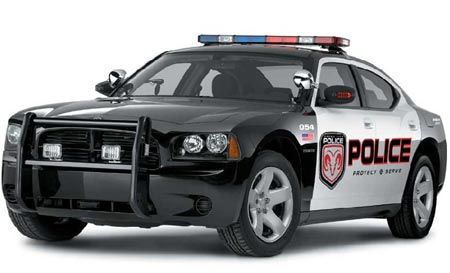It seems Chrysler’s been working on a plan to guarantee itself a revenue stream for years to come.
It’s the Dodge Charger police package.
An astute observer at TelstarLogistics.com spotted a fleet of Chargers, all in varying civilian colors, at the California Highway Patrol’s Fleet Operations Facility near Sacramento. That's where new patrol cars are delivered for outfitting by the CHP with the necessary equipment to make them into patrol vehicles. The cars were all equipped with alloy wheels and looked more like rental cars than police cars, giving no clue to their true identity. They didn’t even have the trademark slightly higher ride level of the typical unmarked Ford.
(more after the jump)
According to the website, which researched its information from a fleet sales trade journal, Government Fleet, the California Highway Patrol had ordered 88 new Dodge Chargers, for which it paid $1.9 million, or slightly less than $22,000 apiece.
It’s a healthy sign for Chrysler’s bottom line. Ford is discontinuing the Crown Victoria, which was badged as the “Police Interceptor” when equipped with the police package. That means almost every police department in the country will need to find a new brand for its next squad car purchase.
Of course, Fords won’t disappear from the police garages overnight. The CHP still has 2,100 of them. But, with police departments around the country having a long-established preference for rear wheel drive sedans powered by V-8 engines, the demise of the Crown Victoria leaves police agencies with only one choice: the Dodge Charger. Chevrolet’s Impala is front wheel drive and is available in a police package only with a V-6.
Those police agencies that won’t be switching to Dodges are the ones that already have done so. Chargers are in the service of the Los Angeles Police Department, the Michigan State Patrol, and the Massachusetts State Police, among others.
Police fleet sales once were an afterthought to the automakers. Chevrolet, for example, dropped its rear wheel drive Caprice partly because a large percentage of its sales were to police departments. Faced with high demand for Suburbans and Tahoes, Chevrolet decided it made more sense to put its limited production of automatic transmissions in civilian vehicles.
But, police department sales become much more valuable to an auto maker once it’s secured a monopoly on the market, as Ford did over the years with the Crown Victoria/Police Interceptor. Fleet sales provide volume that helps amortize development costs. After that, the police package becomes almost like a pension – a guaranteed revenue stream - because police cars are replaced frequently.
At least one thing seems to be working out for Bob Nardelli.

